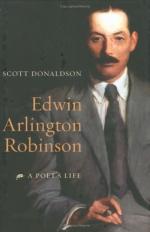|
This section contains 745 words (approx. 3 pages at 300 words per page) |

|
SOURCE: “Robinson's ‘Richard Cory,’” in Explicator, Vol. 19, No. 2, November, 1960, item 9.
In the following essay, Burkhart analyzes the role of word choice in “Richard Cory,” pointing out that Robinson creates a series of contrasts between Cory and the townspeople as well as between Cory's inward and outward selves.
The paradox on which [Edwin Arlington Robinson's] “Richard Cory” is constructed is one familiar enough that the poem itself may seem to lack poetic “surprise,” despite the neatness of the anecdote and the effectively colloquial, almost vulgar, terseness with which Robinson concludes it. The surprise of the poem seems closer to O. Henry than to poetry. One can treat it as no more than an exemplum, and it lends itself to several clichés—appearances are deceiving, the grass is always greener, etc.—so easily that it may seem merely to point a prosaic and tritely ironic moral and to lack...
|
This section contains 745 words (approx. 3 pages at 300 words per page) |

|


